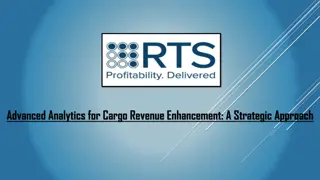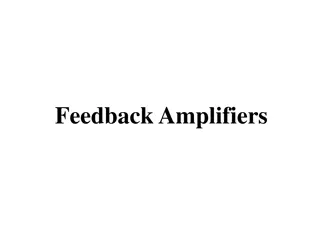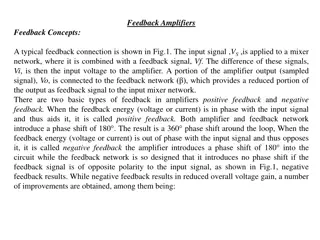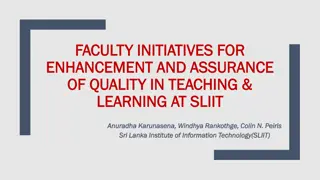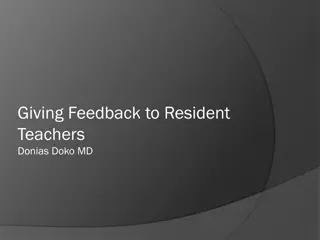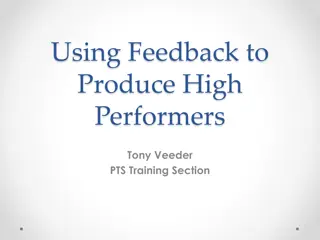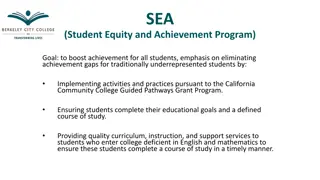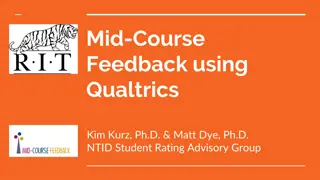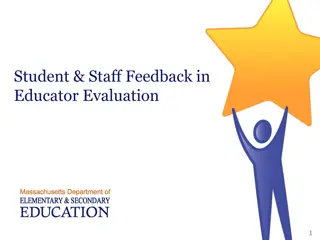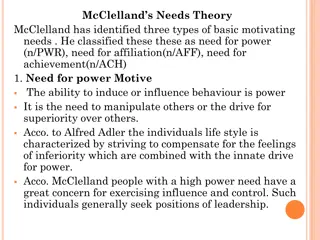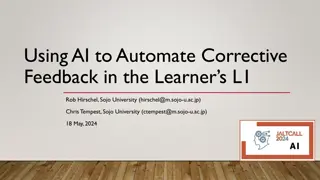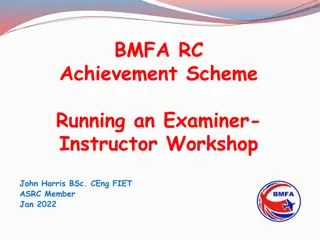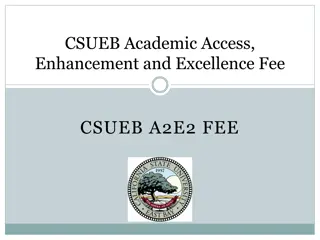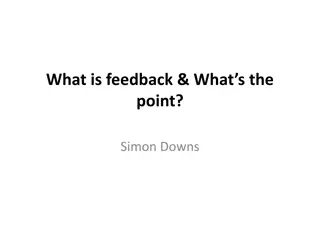Understanding the Importance of Feedback in Achievement Enhancement
Feedback plays a crucial role in encouraging or discouraging behavior, making it essential to provide constructive feedback that focuses on growth and improvement. Improper feedback can lead to incompetence in the workplace. Learn about the definition of feedback, how to give feedback effectively, and models like Pendleton's Principles and the Egan Model that guide feedback processes.
Download Presentation

Please find below an Image/Link to download the presentation.
The content on the website is provided AS IS for your information and personal use only. It may not be sold, licensed, or shared on other websites without obtaining consent from the author. Download presentation by click this link. If you encounter any issues during the download, it is possible that the publisher has removed the file from their server.
E N D
Presentation Transcript
Giving Feedback Dr O Hagan
Feedback The most powerful single modification that enhances achievement is feedback. Feedback can either encourage or discourage behaviour; it is important to get it right. Improper guidance/feedback is the single largest contributor to incompetence in the world of work.
Definition of Feedback Feedback is Providing information about performance or behaviour with the aim of: Affirming what you do well. Helping you develop in areas you do less well. Important: Feedback is NOT about Blame, Approval or Disapproval. Feedback is more neutral - it describes what you did or did not accomplish given a standard or intent.
Giving Feedback How do we do it? Any models or rules?
Think of a Time you were given Feedback badly Think of a time you were given feedback that made you feel humiliated, embarrassed or torn to shreds. What was it about the Content of that feedback that made you feel this way? What was it about the Process of that feedback that made you feel this way? Was there anything about you that didn t help either? How could things have gone better?
Pendletons Principles Check the learner wants and is ready for feedback. Let the learner give comments /background to the material that is being assessed. The learner states what was done well. The observer(s) state what was done well.
Pendletons Principles The learner states what could be improved. The observer(s)state how it could be improved. An action plan for improvement is made. NB: In their book, Pendleton et al state these are guidelines or principles, not rules. This means you do not need to follow them in the exact order listed.
The Egan Model This model aims to help the trainee address 3 main questions: What is going on? What do I want to do instead? How might I get what I want?
Egan Stage 1 Current scenario The story ( What's going on ? ) 1. 2. Blind spots (What s really going on?) 3. Leverage (Focussing / prioritising )
Egan Stage 2 Preferred Scenario Possibilities (ideally what do I do instead ?) Change Agenda (smart goals ) Commitment (check goals are right )
Egan Stage 3 Action Strategies Possible Actions (How many ways are there?) Best fit strategies (What will work for Me ?) Plan ( What next and When ?)
Giving Feedback. Rules of Thumb: Give feedback onlywhen asked orwhen youroffer is accepted. Give feedback as soon after theeventas possible. Focuson the positive. Feedback needs to be given privately when ever possible, especially negative feedback.
Giving Feedback Feedback needs to be part of the overall communication process and developmental dialogue . Use skills such as rapport or mirroring to develop respect and trust with the learner. Focus on behaviours that can be changed , not upon personality traits. Stay in the here and now. Don t bring up old concerns or previous mistakes , unless this is to highlight a pattern of behaviours.
Giving Feedback Talk about and describe specific behaviours, giving examples where possible and do not evaluate or assume motives. Use I and give your experience of the behaviour ( when you said ..,I thought you were ) When giving negative feedback, suggest alternative behaviours.
Giving Feedback Feedback is for the recipient, not the giver be sensitive to the impact of your message. Consider the content of the message, the processes of giving feedback and the congruence between your verbal and nonverbal messages.
Giving Feedback Encourage reflection: this will involve posing open questions such as : a. Did it go as planned ? If not why? b. If you were doing it again what would you do the same next time and what would you do differently ?Why? c. How did you feel during the session? How would you feel about doing it again ? d. How do you think the patient felt ? What makes you feel that ?
Productive Praise Be specific, not a general well done. Don t praise everything . Add depth to praise with detailed feedback . Don t make praise conditional. Don t mix praise with criticism. Use clear and descriptive language of what you are praising and why.
Constructive Criticism Encourage self assessment. Self criticism will make trainee want to change. Remember the problem is the behaviour not the person. Make comments descriptive and objective. Avoid imposing a solution.
Feedback Judgemental or Descriptive? Judgemental : You need to get your self organised. It s causing problems for everyone else including patients OR Descriptive : Lack of note keeping at a clinic caused Mr B not to be referred for OGD. How do you think you might prevent this from happening in the future?
Finally Don t Forget to ask for feedback upon yourself. This helps build rapport and trust with the trainee and encourages the development of a 2-way process in the journey through learning. It also helps you to stop and think about how you are doing as an educator and how your practice or department is doing as a teaching and learning organisation. It reminds us of how it feels to receive feedback, thus not losing sight of how trainees can feel.
Final Thoughts A few words by Jennifer King: Giving feedback is not just to provide a judgement or evaluation, it is to provide insight. Without insight into their own strengths and limitations, (the receiver) cannot progress or resolve difficulties.



